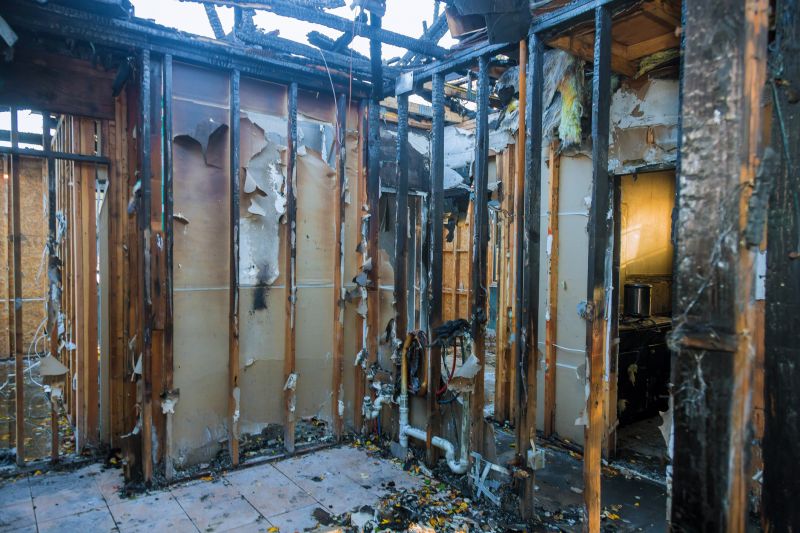Top-Rated Supplies For Fire Damage Restoration Projects
Access high-quality materials and equipment designed to handle the complexities of fire damage repair with confidence.
 Fire restoration products are essential for effectively addressing the aftermath of fire damage in residential and commercial properties. These products aim to clean, restore, and protect surfaces affected by smoke, soot, and heat. Proper selection of fire restoration supplies can help mitigate further damage and facilitate the restoration process. From cleaning agents to protective equipment, a comprehensive set of tools and materials is vital for restoration professionals and DIY enthusiasts alike.
Fire restoration products are essential for effectively addressing the aftermath of fire damage in residential and commercial properties. These products aim to clean, restore, and protect surfaces affected by smoke, soot, and heat. Proper selection of fire restoration supplies can help mitigate further damage and facilitate the restoration process. From cleaning agents to protective equipment, a comprehensive set of tools and materials is vital for restoration professionals and DIY enthusiasts alike.
Top Overall Option
Multi-Purpose Fire Damage Restoration Kit
A versatile kit containing a range of cleaning agents, sealants, odor neutralizers, and safety gear designed to address various aspects of fire damage restoration. It offers a comprehensive solution for both professionals and DIY restorers seeking an all-in-one package.
Types of Products For Fire Restorations
Smoke and Soot Cleaners
Specialized solutions formulated to effectively remove smoke residues and soot from surfaces without causing damage.
Odor Neutralizers
Products designed to eliminate persistent smoke odors from indoor environments and materials.
Fire-Resistant Sealants
Sealants used to prevent the spread of fire and smoke through cracks and joints in structures.
Structural Repair Kits
Sets that include patching compounds and repair materials for restoring damaged surfaces and structures.
Air Scrubbers and Purifiers
Equipment that filters airborne particles and contaminants, improving indoor air quality after fire damage.
Personal Protective Equipment
Safety gear such as respirators, gloves, and coveralls to protect workers during restoration tasks.
Fire-Resistant Drywall and Insulation
Materials that resist ignition and help contain fire spread within structures.
Cleaning Cloths and Sponges
Absorbent and durable cloths designed for applying cleaning solutions and removing residues.
Electrostatic Dusters
Tools that attract and remove dust and soot particles from surfaces efficiently.
Heat-Resistant Paints
Coatings formulated to withstand high temperatures and protect surfaces from heat damage.
Popular Choices
Effective sprays used to clean soot and smoke residues from various surfaces.
Gels that absorb and neutralize lingering smoke odors in indoor spaces.
Caulking products designed to seal gaps and prevent fire and smoke spread.
Reinforcement products used to stabilize and strengthen damaged structural elements.
High-efficiency particulate air purifiers that trap fine particles and improve air quality.
Protective paints designed to resist high temperatures and slow fire spread.
Powerful cleaning agents for removing soot and smoke residues from heavy-duty surfaces.
Specialized drywall panels that offer increased resistance to fire and heat.
Tools for efficient removal of soot and dust from surfaces and hard-to-reach areas.
Devices that disperse odor-neutralizing agents throughout indoor spaces.
The process of fire restoration often begins with thorough assessment and cleaning. Specialized cleaning agents are designed to break down soot and smoke residues without damaging surfaces. Surface prep products, such as primers and sealants, help to stabilize and prepare materials for repainting or refinishing. Additionally, odor neutralizers and air scrubbers play a crucial role in removing persistent smoke smells and improving indoor air quality.
Restoration also involves addressing structural concerns, which may require the use of repair kits, patching compounds, and fire-resistant materials. Protective gear, including respirators, gloves, and coveralls, is necessary to ensure safety during the restoration process. Choosing the right products depends on the extent of damage, the types of surfaces involved, and the specific requirements of each project. Proper application and adherence to safety guidelines are critical for achieving optimal results and ensuring long-term protection against future incidents.
Key Buying Considerations
- Extent of fire and smoke damage to determine the scope of necessary products.
- Type of surfaces affected, such as wood, drywall, or metal, to select compatible cleaning agents.
- Level of odor lingering after initial cleaning to choose effective neutralizers.
- Safety features of protective gear, including respirator filtration levels and comfort.
- Compatibility of sealants and coatings with existing materials and finishes.
- Ease of application and drying times for cleaning and repair products.
- Availability of replacement parts or refill options for equipment like air scrubbers.
- Environmental conditions of the property, such as humidity and temperature, affecting product performance.
- Regulatory compliance and safety standards for fire restoration products.
- Budget constraints balanced with the quality and effectiveness of the products.
- Training or instructions required for proper use of specialized equipment.
- Long-term protection features of fire-resistant materials and coatings.
- Customer reviews and product ratings to gauge reliability and user satisfaction.
- Storage and shelf life of products, especially for unused or emergency supplies.
- Compatibility with other restoration tools and materials used in the project.
